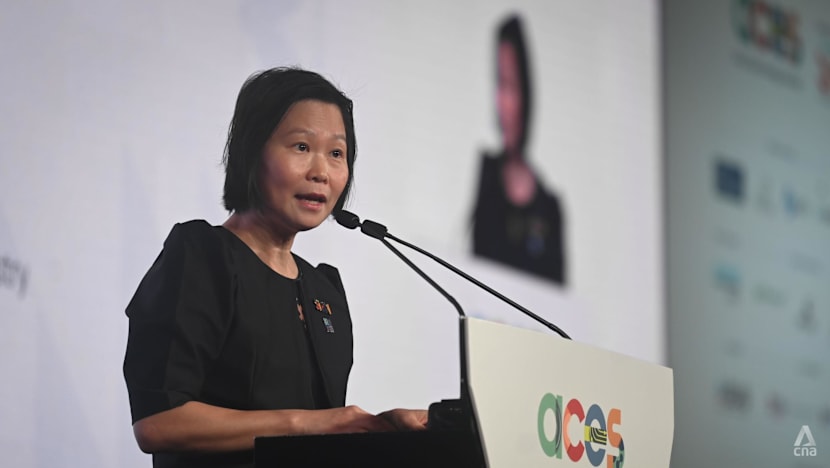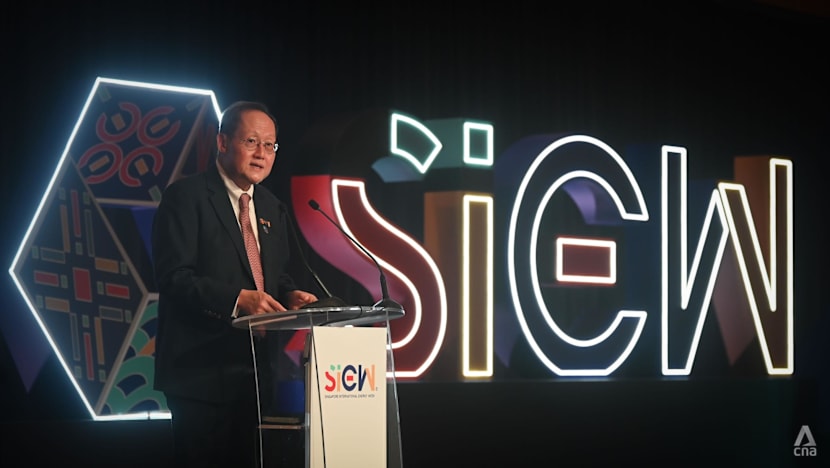As firms grow doubtful of carbon credits, Singapore unveils raft of initiatives to tackle transparency concerns
Voluntary carbon credits have come under scrutiny for lacking integrity, transparency and quality, hence eroding market confidence and triggering reputational risks.

Minister of State for Trade and Industry Gan Siow Huang speaking at the Asia Clean Energy Summit 2025 on Oct 28, 2025. (Photo: ΒιΆΉ/Syamil Sapari)

This audio is generated by an AI tool.
SINGAPORE: Amid doubts from businesses about the quality and integrity of carbon credits globally, Singapore on Tuesday (Oct 28) unveiled a raft of initiatives aimed at helping companies tap the voluntary carbon market.
The measures include S$15 million (US$11.6 million) set aside for a grant to encourage the financial sector to participate in "high-integrity" carbon markets.
"The voluntary carbon market has faced headwinds in recent years," said Minister of State for Trade and Industry Gan Siow Huang at the opening of the Asia Clean Energy Summit.
"Concerns about integrity, transparency and quality of voluntary carbon credits have eroded confidence, while inconsistent standards and negative publicity have raised reputational concerns," Ms Gan said at the event, which is part of Singapore International Energy Week 2025.
"As a result, many companies have hesitated to use voluntary carbon credits to meet their climate commitments or as part of their decarbonisation plans."
Carbon credits are certificates that are generated through projects or activities that aim to reduce, remove or avoid carbon emissions, such as restoring forests or investing in renewable energy. Each credit represents one tonne of carbon dioxide that is either removed from the atmosphere or prevented from being released.
Companies buy carbon credits to offset unavoidable emissions, typically relying on third-party registries such as Verra and Gold Standard to verify that the underlying projects are legitimate.
But the viability and credibility of carbon credits have been questioned in recent years following accusations of greenwashing, due in part to the difficulties of assessing the true environmental impact of the climate action projects.
Controversies surrounding carbon credits
In 2023, British publication The Guardian reported that more than 90 per cent of the rainforest credits issued by Verra were likely to be βphantom creditsβ.
This meant that they did not result in genuine emissions reduction.
Last year, Verra also rejected rice cultivation projects and revoked carbon credits that were issued due to quality concerns.
Critics said this has opened the door to greenwashing β where companies buy credits from dubious projects and claim environmental responsibility that they have not earned.
In one case earlier this year, a German court ruled that Apple could no longer advertise its Apple Watch as a "CO2-neutral product", stating that the tech giant's claim was unfounded.
Media reports state that Apple based its claim on a project in Paraguay that planted eucalyptus trees on leased land, but the court found that the lease for a large portion of the land was only until 2029, calling into question the permanence of the project's environmental benefits.
Against this backdrop, Ms Gan announced four initiatives by Singapore to encourage firms to embark on carbon credit projects.
For a start, Singapore will publish a guidance document to be developed by the government in consultation with industries, she said.
This guide, published on Tuesday, will help firms understand how to use voluntary carbon credits as part of their decarbonisation efforts. It was developed in consultation with the Singapore Sustainable Finance Association, industry partners, academics and international organisations and will be regularly updated to keep pace with developments, according to a press release on the move.
In addition, Enterprise Singapore (EnterpriseSG), a statutory board under the Ministry of Trade and Industry (MTI), is working with leading Asian corporates to form a "buyers' coalition".
This will aggregate and channel demand for "high-integrity voluntary carbon credits in the region and beyond", said Ms Gan. Further details are expected in 2026.
Meanwhile, the Monetary Authority of Singapore (MAS) is introducing a new Financial Sector Carbon Market Development Grant to boost the financial sector's involvement across the carbon value chain. Applications for the grant will open Nov 1, 2025.
MAS will set aside S$15 million from 2025 to 2028 from the Financial Sector Development Fund to provide two tracks of support - build carbon market capabilities and spur the innovative financing solutions and platforms.
"The grant will defray manpower and transaction costs from financing, underwriting and trading of carbon credit projects," Ms Gan said.
To that end, the grant will co-fund manpower and related costs in areas such as carbon project financing, carbon trading, carbon credit insurance and risk management services.
Upfront costs associated with developing, structuring and executing carbon credit transactions, such as carbon insurance premiums, can also be offset by the grant.
The National Climate Change Secretariat, MTI, EnterpriseSG and MAS said in a joint release that carbon markets were "a critical enabler for the global transition to net zero" as they channelled capital towards climate action.
"However, the growth of carbon markets has been constrained in recent years by weak demand, limited supply of high-integrity projects and underdeveloped market infrastructure," the press release stated.
It stated that financial institutions may also face high upfront costs in developing expertise and managing the complexity and risks of early transactions. The grant will help defray near-term cost barriers faced by financial institutions and build the foundation for their continued involvement in carbon markets.
Singapore is set to secure 2.175 million tonnes of high-quality nature-based carbon credits.
This is its first such deal under the Paris Agreement, to support the country's 2030 climate target. Worth around S$76 million, the credits come from four overseas projects in Ghana, Peru and Paraguay. It marks the first tranche of carbon credits Singapore has secured.Β
Ms Gan also noted how the Integrity Council for the Voluntary Carbon Market (ICVCM) has set up its first overseas office in Singapore. The ICVCM is a global body that ensures voluntary carbon credits are of high quality.
The council's decision to set up an office here showcases Singapore's "emerging role as a trusted carbon services hub in Asia-Pacific".
The Singapore office will focus on improving standards for transition credits from retiring young coal-fired power plants in Southeast Asia.
DRAFT RENEWABLE ENERGY CERTIFICATE FRAMEWORK
Ms Gan also announced that MTI and the Energy Market Authority (EMA), along with the International Tracking Standard Foundation (I-TRACK Foundation), have developed a draft framework for renewable energy certificates (RECs) associated with cross-border electricity trade.
These digital certificates serve as proof that electricity consumed is from renewable sources. The certificates can be sold to consumers who value the low-carbon attributes of the electricity associated with the RECs.
"The framework takes reference from international best practices and can be adapted to suit the operating context of different markets in Southeast Asia," Ms Gan said.
She said such a framework for certificates is necessary to support cross-border energy trade, in line with ASEAN's ambitions for a regional power grid.
MTI and EMA have started consulting the industry on the draft framework.
In a press release, MTI, EMA and I-TRACK Foundation said that the use of RECs to track renewable energy and their environmental attributes across borders was complex due to regulatory differences in Southeast Asia.
The framework aims to help countries to standardise their approaches to cross-border RECs across three areas:
- How the physical flow of electricity and the corresponding RECs are tracked;
- Which REC registries and instruments are permitted for cross-border electricity trading transactions;
- The approach for calculating residual mix, referring to the leftover electricity mix that remains in a countryβs system after all renewable energy tracked by RECs has been subtracted.
"This framework will give companies that purchase cross-border RECs greater confidence to make exclusive claims for their sustainability reporting, without concerns that the same unit of renewable electricity is being claimed by some other entity," the joint statement said.

COLLABORATION WITH AUSTRALIA
Separately, the EMA signed a memorandum of understanding (MOU) with the Australian Energy Regulator (AER) to promote cooperation and knowledge exchange on gas and electricity markets. AER regulates wholesale and retail energy markets and energy networks in Australia.
The exchange of the MOU between Singapore and Australia was witnessed by Minister-in-charge of Science and Energy & Technology Tan See Leng, who was opening the Singapore-IEA forum that is part of the slate of events for this year's Singapore International Energy Week.
EMA said in a press release that the deal would facilitate the exchange of knowledge on low-carbon technologies and "deepen cooperation at multilateral platforms in support of the regionβs energy transition".
Under the agreement, there will be activities such as training and exchange programmes, as well as dialogues between both sides.














